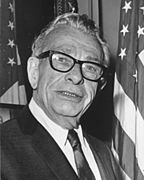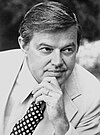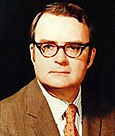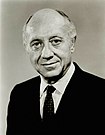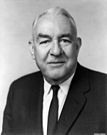1968 United States Senate elections
| |||||||||||||||||||||||||||||||||||||||||||
34 of the 100 seats in the United States Senate 51 seats needed for a majority | |||||||||||||||||||||||||||||||||||||||||||
|---|---|---|---|---|---|---|---|---|---|---|---|---|---|---|---|---|---|---|---|---|---|---|---|---|---|---|---|---|---|---|---|---|---|---|---|---|---|---|---|---|---|---|---|
| |||||||||||||||||||||||||||||||||||||||||||
 Results of the elections: Democratic gain Democratic hold Republican gain Republican hold No election | |||||||||||||||||||||||||||||||||||||||||||
| |||||||||||||||||||||||||||||||||||||||||||
The 1968 United States Senate elections were elections for the United States Senate which coincided with the presidential election. Although Richard Nixon won the presidential election narrowly, the Republicans picked up five net seats in the Senate. Republicans would gain another seat after the election when Alaska Republican Ted Stevens was appointed to replace Democrat Bob Bartlett.
Results summary
| style="background:Template:Democratic Party (US)/meta/color; width:58%" | 58 | style="background:Template:Republican Party (US)/meta/color; width:42%" | 42 |
| Democratic | Republican |
| Parties | style="background-color:Template:Democratic Party (US)/meta/color" | | style="background-color:Template:Republican Party (US)/meta/color" | | style="background-color:Template:Conservative Party (New York)/meta/color" | | style="background-color:Template:Other Party (US)/meta/color" | | Total | ||||||||||||||||||||||||||||||||||||||||||||||||||||||||||||||||||||||||||||||||||||||||||||||
|---|---|---|---|---|---|---|---|---|---|---|---|---|---|---|---|---|---|---|---|---|---|---|---|---|---|---|---|---|---|---|---|---|---|---|---|---|---|---|---|---|---|---|---|---|---|---|---|---|---|---|---|---|---|---|---|---|---|---|---|---|---|---|---|---|---|---|---|---|---|---|---|---|---|---|---|---|---|---|---|---|---|---|---|---|---|---|---|---|---|---|---|---|---|---|---|---|---|---|---|
| Democratic | Republican | Conservative | Other | ||||||||||||||||||||||||||||||||||||||||||||||||||||||||||||||||||||||||||||||||||||||||||||||||
| Last election (1966) | 64 | 36 | 0 | 0 | 100 | ||||||||||||||||||||||||||||||||||||||||||||||||||||||||||||||||||||||||||||||||||||||||||||||
| Before these elections | 63 | 37 | 0 | 0 | 100 | ||||||||||||||||||||||||||||||||||||||||||||||||||||||||||||||||||||||||||||||||||||||||||||||
| Not up | 40 | 26 | 0 | 0 | 66 | ||||||||||||||||||||||||||||||||||||||||||||||||||||||||||||||||||||||||||||||||||||||||||||||
| Up Class 3 (1962→1968) |
23 | 11 | 0 | 0 | 34 | ||||||||||||||||||||||||||||||||||||||||||||||||||||||||||||||||||||||||||||||||||||||||||||||
| Incumbent retired | 3 | 3 | — | — | 6 | ||||||||||||||||||||||||||||||||||||||||||||||||||||||||||||||||||||||||||||||||||||||||||||||
| Held by same party | 1 | 2 | — | — | 3 | ||||||||||||||||||||||||||||||||||||||||||||||||||||||||||||||||||||||||||||||||||||||||||||||
| Replaced by other party | — | — | 3 | ||||||||||||||||||||||||||||||||||||||||||||||||||||||||||||||||||||||||||||||||||||||||||||||||
| Result | 2 | 4 | 0 | 0 | 6 | ||||||||||||||||||||||||||||||||||||||||||||||||||||||||||||||||||||||||||||||||||||||||||||||
| Incumbent ran | 20 | 8 | — | — | 28 | ||||||||||||||||||||||||||||||||||||||||||||||||||||||||||||||||||||||||||||||||||||||||||||||
| Won re-election | 13 | 7 | — | — | 20 | ||||||||||||||||||||||||||||||||||||||||||||||||||||||||||||||||||||||||||||||||||||||||||||||
| Lost re-election | — | — | 4 | ||||||||||||||||||||||||||||||||||||||||||||||||||||||||||||||||||||||||||||||||||||||||||||||||
| Lost renomination, but held by same party |
2 | 0 | — | — | 2 | ||||||||||||||||||||||||||||||||||||||||||||||||||||||||||||||||||||||||||||||||||||||||||||||
| Lost renomination, and party lost |
— | — | 2 | ||||||||||||||||||||||||||||||||||||||||||||||||||||||||||||||||||||||||||||||||||||||||||||||||
| Result | 16 | 12 | 0 | 0 | 28 | ||||||||||||||||||||||||||||||||||||||||||||||||||||||||||||||||||||||||||||||||||||||||||||||
| Total elected | 18 | 16 | 0 | 0 | 34 | ||||||||||||||||||||||||||||||||||||||||||||||||||||||||||||||||||||||||||||||||||||||||||||||
| Net gain/loss | 5 | ||||||||||||||||||||||||||||||||||||||||||||||||||||||||||||||||||||||||||||||||||||||||||||||||||
| Nationwide vote | 24,976,660 | 23,588,832[b] | 1,139,402 | 989,058 | 50,693,952 | ||||||||||||||||||||||||||||||||||||||||||||||||||||||||||||||||||||||||||||||||||||||||||||||
| Share | 49.27% | 46.53% | 2.25% | 1.95% | 100% | ||||||||||||||||||||||||||||||||||||||||||||||||||||||||||||||||||||||||||||||||||||||||||||||
| Result | 58[a] | 42 | 0 | 0 | 100 | ||||||||||||||||||||||||||||||||||||||||||||||||||||||||||||||||||||||||||||||||||||||||||||||
Source: Clerk of the U.S. House of Representatives[1]
Incumbents who retired
Democratic hold
- Alabama: J. Lister Hill (D) was replaced by James Allen (D).
Democratic gain
- Iowa: Bourke B. Hickenlooper (R) was replaced by Harold Hughes (D).
Republican holds
- Kansas: Frank Carlson (R) was replaced by Bob Dole (R).
- Kentucky: Thruston Ballard Morton (R) was replaced by Marlow Cook (R).
Republican gains
- Arizona: Carl Hayden (D) was replaced by Barry Goldwater (R), who gave up Arizona's other Senate seat in 1964 to run for president.
- Florida: George Smathers (D) was replaced by Edward Gurney (R), the first Republican to represent Florida in the U.S. Senate since Reconstruction.
Incumbents who lost their seats
Democratic holds
- Alaska: Ernest Gruening (D) lost renomination to Mike Gravel (D), who later won the general election.
- Missouri: Edward V. Long (D) lost renomination to Thomas Eagleton (D), who later won the general election.
Democratic gain
- California: Thomas Kuchel (R) lost renomination to Max Rafferty (R), who later lost the general election to Alan Cranston (D).
Republican gains
- Maryland: Daniel Brewster (D) lost re-election to Charles Mathias (R)
- Ohio: Frank Lausche (D) lost renomination to John J. Gilligan (D), who later lost the general election to William B. Saxbe (R).
- Oklahoma: Mike Monroney (D), lost re-election to Henry Bellmon (R).
- Oregon: Wayne Morse (D), lost re-election to Bob Packwood (R).
- Pennsylvania: Joseph S. Clark Jr. (D), lost re-election to Richard Schweiker (R).
Later change
Republican gain
- Alaska: Bob Bartlett (D) died December 11, 1968, and Ted Stevens (R) was appointed December 24, 1968.
Change in composition
Before the elections
| D1 | D2 | D3 | D4 | D5 | D6 | D7 | D8 | D9 | D10 |
| D20 | D19 | D18 | D17 | D16 | D15 | D14 | D13 | D12 | D11 |
| D21 | D22 | D23 | D24 | D25 | D26 | D27 | D28 | D29 | D30 |
| D40 | D39 | D38 | D37 | D36 | D35 | D34 | D33 | D32 | D31 |
| D41 Ala. Retired |
D42 Alaska Ran |
D43 Ariz. Retired |
D44 Ark. Ran |
D45 Conn. Ran |
D46 Fla. Retired |
D47 Ga. Ran |
D48 Hawaii Ran |
D49 Idaho Ran |
D50 Ind. Ran |
| Majority → | D51 La. Ran | ||||||||
| D60 S.C. Ran |
D59 Pa. Ran |
D58 Ore. Ran |
D57 Okla. Ran |
D56 Ohio Ran |
D55 N.C. Ran |
D54 Nev. Ran |
D53 Mo. Ran |
D52 Md. Ran | |
| D61 S.D. Ran |
D62 Wash. Ran |
D63 Wisc. Ran |
R37 Vt. Ran |
R36 Utah Ran |
R35 N.D. Ran |
R34 N.Y. Ran |
R33 N.H. Ran |
R32 Ky. Ran |
R31 Kan. Retired |
| R21 | R22 | R23 | R24 | R25 | R26 | R27 Calif. Ran |
R28 Colo. Ran |
R29 Ill. Ran |
R30 Iowa Retired |
| R20 | R19 | R18 | R17 | R16 | R15 | R14 | R13 | R12 | R11 |
| R1 | R2 | R3 | R4 | R5 | R6 | R7 | R8 | R9 | R10 |
After the general elections
| D1 | D2 | D3 | D4 | D5 | D6 | D7 | D8 | D9 | D10 |
| D20 | D19 | D18 | D17 | D16 | D15 | D14 | D13 | D12 | D11 |
| D21 | D22 | D23 | D24 | D25 | D26 | D27 | D28 | D29 | D30 |
| D40 | D39 | D38 | D37 | D36 | D35 | D34 | D33 | D32 | D31 |
| D41 Ala. Hold |
D42 Alaska Hold |
D43 Ark. Re-elected |
D44 Conn. Re-elected |
D45 Ga. Re-elected |
D46 Hawaii Re-elected |
D47 Idaho Re-elected |
D48 Ind. Re-elected |
D49 La. Re-elected |
D50 Mo. Hold |
| Majority → | D51 Nev. Re-elected | ||||||||
| R41 Ore. Gain |
R42 Pa. Gain |
D58 Iowa Gain |
D57 Calif. Gain |
D56 Wisc. Re-elected |
D55 Wash. Re-elected |
D54 S.D. Re-elected |
D53 S.C. Re-elected |
D52 N.C. Re-elected | |
| R40 Okla. Gain |
R39 Ohio Gain |
R38 Md. Gain |
R37 Fla. Gain |
R36 Ariz. Gain |
R35 Vt. Re-elected |
R34 Utah Re-elected |
R33 N.D. Re-elected |
R32 N.Y. Re-elected |
R31 N.H. Re-elected |
| R21 | R22 | R23 | R24 | R25 | R26 | R27 Colo. Re-elected |
R28 Ill. Re-elected |
R29 Kan. Hold |
R30 Ky. Hold |
| R20 | R19 | R18 | R17 | R16 | R15 | R14 | R13 | R12 | R11 |
| R1 | R2 | R3 | R4 | R5 | R6 | R7 | R8 | R9 | R10 |
Beginning of the next Congress
| D1 | D2 | D3 | D4 | D5 | D6 | D7 | D8 | D9 | D10 |
| D20 | D19 | D18 | D17 | D16 | D15 | D14 | D13 | D12 | D11 |
| D21 | D22 | D23 | D24 | D25 | D26 | D27 | D28 | D29 | D30 |
| D40 | D39 | D38 | D37 | D36 | D35 | D34 | D33 | D32 | D31 |
| D41 | D42 | D43 | D44 | D45 | D46 | D47 | D48 | D49 | D50 |
| Majority → | D51 | ||||||||
| R41 | R42 | R43 Alaska (Class 2) Gain |
D57 | D56 | D55 | D54 | D53 | D52 | |
| R40 | R39 | R38 | R37 | R36 | R35 | R34 | R33 | R32 | R31 |
| R21 | R22 | R23 | R24 | R25 | R26 | R27 | R28 | R29 | R30 |
| R20 | R19 | R18 | R17 | R16 | R15 | R14 | R13 | R12 | R11 |
| R1 | R2 | R3 | R4 | R5 | R6 | R7 | R8 | R9 | R10 |
| Key: |
|
|---|
Race summary
Elections leading to the next Congress
In these general elections, the winners were elected for the term beginning January 3, 1969; ordered by state.
All of the elections involved the Class 3 seats.
| State (linked to summaries below) |
Incumbent | Results | Candidates | ||
|---|---|---|---|---|---|
| Senator | Party | Electoral history | |||
| Alabama | J. Lister Hill | Democratic | 1938 (Appointed) 1938 1944 1950 1956 1962 |
Incumbent retired. New senator elected. Democratic hold. |
|
| Alaska | Ernest Gruening | Democratic | 1958 1962 |
Incumbent lost renomination. Incumbent lost re-election as a Democratic write-in. New senator elected. Democratic hold. |
|
| Arizona | Carl Hayden | Democratic | 1926 1932 1938 1944 1950 1956 1962 |
Incumbent retired. New senator elected. Republican gain. |
|
| Arkansas | J. William Fulbright | Democratic | 1944 1950 1956 1962 |
Incumbent re-elected. |
|
| California | Thomas Kuchel | Republican | 1953 (Appointed) 1954 (Special) 1956 1962 |
Incumbent lost renomination. New senator elected. Democratic gain. |
|
| Colorado | Peter H. Dominick | Republican | 1962 | Incumbent re-elected. |
|
| Connecticut | Abraham Ribicoff | Democratic | 1962 | Incumbent re-elected. |
|
| Florida | George Smathers | Democratic | 1950 1956 1962 |
Incumbent retired. New senator elected. Republican gain. |
|
| Georgia | Herman Talmadge | Democratic | 1956 1962 |
Incumbent re-elected. |
|
| Hawaii | Daniel Inouye | Democratic | 1962 | Incumbent re-elected. |
|
| Idaho | Frank Church | Democratic | 1956 1962 |
Incumbent re-elected. |
|
| Illinois | Everett Dirksen | Republican | 1950 1956 1962 |
Incumbent re-elected. |
|
| Indiana | Birch Bayh | Democratic | 1962 | Incumbent re-elected. |
|
| Iowa | Bourke B. Hickenlooper | Republican | 1944 1950 1956 1962 |
Incumbent retired. New senator elected. Democratic gain. |
|
| Kansas | Frank Carlson | Republican | 1950 (Special) 1950 1956 1962 |
Incumbent retired. New senator elected. Republican hold. |
|
| Kentucky | Thruston Ballard Morton | Republican | 1956 1962 |
Incumbent retired. New senator elected. Republican hold. |
|
| Louisiana | Russell B. Long | Democratic | 1948 (Special) 1950 1956 1962 |
Incumbent re-elected. |
|
| Maryland | Daniel Brewster | Democratic | 1962 | Incumbent lost re-election. New senator elected. Republican gain. |
|
| Missouri | Edward V. Long | Democratic | 1960 (Appointed) 1960 (Special) 1962 |
Incumbent lost renomination. New senator elected. Democratic hold. |
|
| Nevada | Alan Bible | Democratic | 1954 (Special) 1956 1962 |
Incumbent re-elected. |
|
| New Hampshire | Norris Cotton | Republican | 1954 (Special) 1956 1962 |
Incumbent re-elected. |
|
| New York | Jacob Javits | Republican | 1956 1962 |
Incumbent re-elected. |
|
| North Carolina | Sam Ervin | Democratic | 1954 (Special) 1954 (Appointed) 1956 1962 |
Incumbent re-elected. |
|
| North Dakota | Milton Young | Republican | 1945 (Appointed) 1946 (Special) 1950 1956 1962 |
Incumbent re-elected. |
|
| Ohio | Frank J. Lausche | Democratic | 1956 1962 |
Incumbent lost renomination. New senator elected. Republican gain. |
|
| Oklahoma | Mike Monroney | Democratic | 1950 1956 1962 |
Incumbent lost re-election. New senator elected. Republican gain. |
|
| Oregon | Wayne Morse | Democratic | 1944 1950 1956 1962 |
Incumbent lost re-election. New senator elected. Republican gain. |
|
| Pennsylvania | Joseph S. Clark Jr. | Democratic | 1956 1962 |
Incumbent lost re-election. New senator elected. Republican gain. |
|
| South Carolina | Fritz Hollings | Democratic | 1966 (Special) | Incumbent re-elected. |
|
| South Dakota | George McGovern | Democratic | 1962 | Incumbent re-elected. |
|
| Utah | Wallace F. Bennett | Republican | 1950 1956 1962 |
Incumbent re-elected. |
|
| Vermont | George Aiken | Republican | 1940 (Special) 1944 1950 1956 1962 |
Incumbent re-elected. |
|
| Washington | Warren Magnuson | Democratic | 1944 (Appointed) 1944 1950 1956 1962 |
Incumbent re-elected. |
|
| Wisconsin | Gaylord Nelson | Democratic | 1962 | Incumbent re-elected. |
|
Alabama
| |||||||||||||||||||||
This section needs expansion. You can help by adding to it. (August 2017) |
| Party | Candidate | Votes | % | |
|---|---|---|---|---|
| Democratic | James Allen | 638,774 | 69.71 | |
| Republican | Perry O. Hooper Sr. | 201,227 | 21.96 | |
| National Democratic (Ala.) | Robert Schwenn | 76,299 | 8.33 | |
| Majority | 437,547 | 47.75 | ||
| Turnout | 916,300 | |||
| Democratic hold | ||||
Alaska
| |||||||||||||||||||||
| |||||||||||||||||||||
Democrat Ernest Gruening lost renomination to fellow Democrat Mike Gravel. Gruening then ran as an Independent, but lost again to Gravel in the general election, thereby keeping the seat in Democratic hands.
This section needs expansion. You can help by adding to it. (August 2017) |
| Party | Candidate | Votes | % | |
|---|---|---|---|---|
| Democratic | Mike Gravel | 36,527 | 45.13 | |
| Republican | Elmer E. Rasmuson | 30,286 | 37.42 | |
| Independent | Ernest Gruening (Incumbent) | 14,118 | 17.44 | |
| Majority | 6,241 | 7.71 | ||
| Turnout | 80,931 | |||
| Democratic hold | ||||
Two months after the election, on December 11, 1968, the other Alaskan senator, Democrat Bob Bartlett, died. Republican Ted Stevens was then appointed to that other seat.
Arizona
| |||||||||||||||||
 U.S. Senate election results map. Red denotes counties won by Goldwater. Blue denotes those won by Elson. | |||||||||||||||||
| |||||||||||||||||
Incumbent Democrat Carl Hayden did not run for re-election to an eighth term, with his longtime staff member Roy Elson running as the Democratic Party nominee to replace him. Elson beat State Treasurer of Arizona Bob Kennedy in the Primary.
| Party | Candidate | Votes | % | |
|---|---|---|---|---|
| Democratic | Roy Elson | 95,231 | 62.78 | |
| Democratic | Bob Kennedy | 41,397 | 27.29 | |
| Democratic | Dick Herbert | 15,061 | 9.93 | |
| Turnout | 151,689 | 43.18 | ||
Elson was defeated by a wide margin, however, by former U.S. senator and Republican Presidential nominee Barry Goldwater. Prior to Goldwater's election, the seat had been held for decades by the Democratic Party under Carl Hayden, and has thus far remained in Republican Party control since. Elson had previously challenged U.S. senator Paul Fannin in 1964, when Goldwater vacated his seat to run for President against Lyndon B. Johnson.
| Party | Candidate | Votes | % | |
|---|---|---|---|---|
| Republican | Barry Goldwater | 274,607 | 57.22 | |
| Democratic | Roy Elson | 205,338 | 42.78 | |
| Majority | 69,269 | 14.44 | ||
| Turnout | 479,945 | 78.08 | ||
| Republican gain from Democratic | ||||
Arkansas
| |||||||||||||||||
 County Results Fulbright: 50–60% 60–70% 70–80% | |||||||||||||||||
| |||||||||||||||||
This section needs expansion. You can help by adding to it. (August 2017) |
| Party | Candidate | Votes | % | |
|---|---|---|---|---|
| Democratic | J. William Fulbright (Incumbent) | 349,965 | 59.15 | |
| Republican | Charles T. Bernard | 241,731 | 40.85 | |
| Majority | 108,234 | 18.30 | ||
| Turnout | 591,696 | |||
| Democratic hold | ||||
California
| |||||||||||||||||
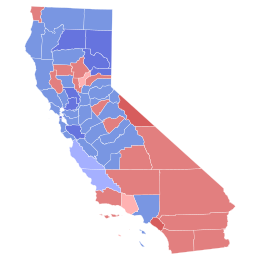 County Results Cranston: 40-50% 50–60% 60–70% Rafferty: 40–50% 50–60% 60–70% | |||||||||||||||||
| |||||||||||||||||
This section needs expansion. You can help by adding to it. (August 2017) |
| Party | Candidate | Votes | % | |
|---|---|---|---|---|
| Democratic | Alan Cranston | 3,615,261 | 51.78 | |
| Republican | Max Rafferty | 3,275,679 | 46.91 | |
| Peace and Freedom | Paul Jacobs | 91,254 | 1.31 | |
| Majority | 339,582 | 4.87 | ||
| Turnout | 6,982,194 | |||
| Democratic gain from Republican | ||||
Colorado
This article needs additional citations for verification. (June 2020) |
| |||||||||||||||||
 County results Dominick: 50–60% 60–70% 70–80% McNichols: 50–60% 60–70% | |||||||||||||||||
| |||||||||||||||||
This section needs expansion. You can help by adding to it. (August 2017) |
| Party | Candidate | Votes | % | |
|---|---|---|---|---|
| Republican | Peter H. Dominick (Incumbent) | 459,952 | 58.55 | |
| Democratic | Stephen L. R. McNichols | 325,584 | 41.45 | |
| Majority | 134,368 | 17.10 | ||
| Turnout | 785,536 | |||
| Republican hold | ||||
Connecticut
This article needs additional citations for verification. (June 2020) |
| |||||||||||||||||
 County results Ribicoff: 50–60% May: 50-60% | |||||||||||||||||
| |||||||||||||||||
This section needs expansion. You can help by adding to it. (August 2017) |
| Party | Candidate | Votes | % | |
|---|---|---|---|---|
| Democratic | Abraham Ribicoff (Incumbent) | 655,043 | 54.29 | |
| Republican | Edwin H. May Jr. | 551,455 | 45.71 | |
| None | Scattering | 39 | 0.00 | |
| Majority | 103,588 | 8.58 | ||
| Turnout | 1,206,537 | |||
| Democratic hold | ||||
Florida
| |||||||||||||||||
 County Results
Gurney: 50–60% 60–70% 70–80% Collins: 50–60% 60–70% | |||||||||||||||||
| |||||||||||||||||
This section needs expansion. You can help by adding to it. (August 2017) |
| Party | Candidate | Votes | % | |
|---|---|---|---|---|
| Republican | Edward J. Gurney | 1,131,499 | 55.90 | |
| Democratic | LeRoy Collins | 892,637 | 44.10 | |
| Majority | 238,862 | 11.80 | ||
| Turnout | 2,024,136 | |||
| Republican gain from Democratic | ||||
Georgia
| |||||||||||||||||
| |||||||||||||||||
This section needs expansion. You can help by adding to it. (August 2017) |
| Party | Candidate | Votes | % | |
|---|---|---|---|---|
| Democratic | Herman Talmadge (Incumbent) | 885,093 | 77.50 | |
| Republican | E. Earl Patton | 256,796 | 22.49 | |
| None | Write-Ins | 95 | 0.01 | |
| Majority | 628,297 | 55.01 | ||
| Turnout | 1,141,984 | |||
| Democratic hold | ||||
Hawaii
| |||||||||||||||||
 County results Inouye: 80–90% | |||||||||||||||||
| |||||||||||||||||
This section needs expansion. You can help by adding to it. (August 2017) |
| Party | Candidate | Votes | % | |
|---|---|---|---|---|
| Democratic | Daniel Inouye (Incumbent) | 189,248 | 83.40 | |
| Republican | Wayne C. Thiessen | 34,008 | 14.99 | |
| Peace and Freedom | Oliver M. Lee | 3,671 | 1.62 | |
| Majority | 155,240 | 68.41 | ||
| Turnout | 226,927 | |||
| Democratic hold | ||||
Idaho
| |||||||||||||||||
| |||||||||||||||||
This section needs expansion. You can help by adding to it. (August 2017) |
| Party | Candidate | Votes | % | |
|---|---|---|---|---|
| Democratic | Frank Church (Incumbent) | 173,482 | 60.26 | |
| Republican | George V. Hansen | 114,394 | 39.74 | |
| Majority | 59,088 | 20.52 | ||
| Turnout | 287,876 | |||
| Democratic hold | ||||
Illinois
| |||||||||||||||||
| |||||||||||||||||
Incumbent Republican and Minority Leader Everett Dirksen won re-election to his fourth term over William G. Clark (D), the Illinois Attorney General.
| Party | Candidate | Votes | % | |
|---|---|---|---|---|
| Republican | Everett Dirksen (Incumbent) | 2,358,947 | 53.01 | |
| Democratic | William G. Clark | 2,073,242 | 46.59 | |
| Socialist Labor | Louis Fisher | 17,542 | 0.39 | |
| Independent | Write-in candidates | 26 | 0.00 | |
| Invalid or blank votes | ||||
| Total votes | 4,449,757 | 100.00 | ||
| Turnout | ||||
| Republican hold | ||||
Indiana
| |||||||||||||||||
| |||||||||||||||||
This section needs expansion. You can help by adding to it. (August 2017) |
| Party | Candidate | Votes | % | |
|---|---|---|---|---|
| Democratic | Birch Bayh (Incumbent) | 1,060,456 | 51.65 | |
| Republican | William Ruckelshaus | 988,571 | 48.15 | |
| Prohibition | L. Earl Malcolm | 2,844 | 0.14 | |
| Socialist Workers | Ralph Levitt | 1,247 | 0.06 | |
| Majority | 71,885 | 3.50 | ||
| Turnout | 2,053,118 | |||
| Democratic hold | ||||
Iowa

Four-term Republican Bourke B. Hickenlooper retired. Two-term Democratic Governor of Iowa Harold Hughes was elected senator in a close race against Republican state senator David M. Stanley.
| Party | Candidate | Votes | % | |
|---|---|---|---|---|
| Democratic | Harold Hughes | 574,884 | 50.25 | |
| Republican | David M. Stanley | 568,469 | 49.69 | |
| Prohibition | Uerne M. Higens | 727 | 0.06 | |
| None | Scattering | 6 | 0.00 | |
| Majority | 6,415 | 0.56 | ||
| Turnout | 1,144,086 | 41.52 | ||
| Democratic gain from Republican | ||||
Kansas
| |||||||||||||||||
 County Results | |||||||||||||||||
| |||||||||||||||||
This section needs expansion. You can help by adding to it. (August 2017) |
| Party | Candidate | Votes | % | |
|---|---|---|---|---|
| Republican | Bob Dole | 490,911 | 60.08 | |
| Democratic | William I. Robinson | 315,911 | 38.66 | |
| Prohibition | Joseph Fred Hyskell | 10,262 | 1.26 | |
| None | Scattering | 12 | 0.00 | |
| Majority | 175,000 | 21.42 | ||
| Turnout | 817,096 | |||
| Republican hold | ||||
Kentucky
| |||||||||||||||||
| |||||||||||||||||
This section needs expansion. You can help by adding to it. (August 2017) |
| Party | Candidate | Votes | % | |
|---|---|---|---|---|
| Republican | Marlow Cook | 484,260 | 51.36 | |
| Democratic | Katherine Peden | 448,960 | 47.62 | |
| American Independent | Duane F. Olsen | 9,645 | 1.02 | |
| Majority | 35,300 | 3.74 | ||
| Turnout | 942,865 | |||
| Republican hold | ||||
Louisiana

This section needs expansion. You can help by adding to it. (August 2017) |
| Party | Candidate | Votes | % | |
|---|---|---|---|---|
| Democratic | Russell B. Long (Incumbent) | 518,586 | 100.00 | |
| Democratic hold | ||||
Maryland
| |||||||||||||||||||||
 County results Mathias: 30–40% 40–50% 50–60% 60–70% Brewster: 30–40% 40–50% 50–60% | |||||||||||||||||||||
| |||||||||||||||||||||
This section needs expansion. You can help by adding to it. (August 2017) |
| Party | Candidate | Votes | % | |
|---|---|---|---|---|
| Republican | Charles Mathias | 541,893 | 47.78 | |
| Democratic | Daniel B. Brewster (Incumbent) | 443,667 | 39.12 | |
| American Independent | George P. Mahoney | 148,467 | 13.09 | |
| Majority | 8,226 | 8.66 | ||
| Turnout | 1,134,027 | |||
| Republican gain from Democratic | ||||
Missouri

This section needs expansion. You can help by adding to it. (August 2017) |
| Party | Candidate | Votes | % | |
|---|---|---|---|---|
| Democratic | Thomas Eagleton | 880,113 | 51.01 | |
| Republican | Thomas B. Curtis | 845,144 | 48.99 | |
| Majority | 34,969 | 2.02 | ||
| Turnout | 1,725,257 | |||
| Democratic hold | ||||
Nevada

This section needs expansion. You can help by adding to it. (August 2017) |
| Party | Candidate | Votes | % | |
|---|---|---|---|---|
| Democratic | Alan Bible (Incumbent) | 83,622 | 54.76 | |
| Republican | Edward Fike | 69,083 | 45.24 | |
| Majority | 14,539 | 9.52 | ||
| Turnout | 152,705 | |||
| Democratic hold | ||||
New Hampshire

This section needs expansion. You can help by adding to it. (August 2017) |
| Party | Candidate | Votes | % | |
|---|---|---|---|---|
| Republican | Norris Cotton (Incumbent) | 170,163 | 59.29 | |
| Democratic | John W. King | 116,816 | 40.71 | |
| Majority | 53,347 | 18.48 | ||
| Turnout | 286,979 | |||
| Republican hold | ||||
New York
| |||||||||||||||||||||
| |||||||||||||||||||||
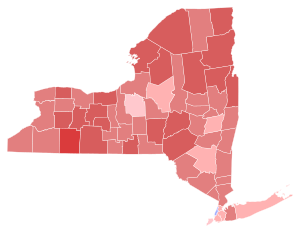 County results | |||||||||||||||||||||
| |||||||||||||||||||||
Incumbent Republican Jacob K. Javits won against Democratic challenger Paul O'Dwyer and Conservative Party challenger James L. Buckley in a three-way election.
While Javits did not face any challengers for the Republican nomination, he did face a minor one when seeking the Liberal Party of New York's nomination.
| Party | Candidate | Votes | % | |
|---|---|---|---|---|
| Democratic | Paul O'Dwyer, former New York City Councilman |
275,877 | 36.14 | |
| Democratic | Eugene Nickerson, Nassau County Executive |
257,639 | 33.75 | |
| Democratic | Joseph Y. Resnick, U.S. Representative |
229,893 | 30.11 | |
| Total votes | 763,409 | 100.00 | ||
| Party | Candidate | Votes | % | |
|---|---|---|---|---|
| Liberal | Jacob K. Javits | 10,277 | 72.14 | |
| Liberal | Murray Baron | 3,969 | 27.86 | |
| Total votes | 14,246 | 100.00 | ||
| Party | Candidate | Votes | % | |
|---|---|---|---|---|
| Republican | Jacob K. Javits (Incumbent) | 2,810,836 | ||
| Liberal | Jacob K. Javits | 458,936 | ||
| Total | Jacob K. Javits | 3,269,772 | 49.68 | |
| Democratic | Paul O'Dwyer | 2,150,695 | 32.68 | |
| Conservative | James L. Buckley, Attorney |
1,139,402 | 17.31 | |
| Peace and Freedom | Herman Ferguson | 8,775 | 0.13 | |
| Socialist Labor | John Emanuel | 7,964 | 0.12 | |
| Socialist Workers | Hedda Garza | 4,979 | 0.08 | |
| Majority | 1,119,113 | 17.00 | ||
| Turnout | 6,581,551 | 39.22 | ||
| Republican hold | ||||
North Carolina
| |||||||||||||||||
| |||||||||||||||||
The general election was fought between the Democratic incumbent Sam Ervin and the Republican nominee Robert Somers. Ervin won re-election to a third full term, with over 60% of the vote.
The first round of the Primary Election was held on May 4, 1968.[11] The runoff for the Republican Party candidates took place on June 1.[12]
| Party | Candidate | Votes | % | |
|---|---|---|---|---|
| Democratic | Sam Ervin | 499,392 | 82.12 | |
| Democratic | Charles Pratt | 60,362 | 9.90 | |
| Democratic | John Gathings | 48,357 | 7.95 | |
| Turnout | 608,111 | |||
| Party | Candidate | Votes | % | |
|---|---|---|---|---|
| Republican | Robert Somers | 48,351 | 36.63 | |
| Republican | J. L. Zimmerman | 43,644 | 33.06 | |
| Republican | B. E. Sweatt | 40,023 | 30.32 | |
| Turnout | 132,018 | |||
| Party | Candidate | Votes | % | |
|---|---|---|---|---|
| Republican | Robert Somers | 8,816 | 60.59 | |
| Republican | J. L. Zimmerman | 5,734 | 39.41 | |
| Turnout | 14,550 | |||
| Party | Candidate | Votes | % | |
|---|---|---|---|---|
| Democratic | Sam Ervin (Incumbent) | 870,406 | 60.56 | |
| Republican | Robert Somers | 566,834 | 39.44 | |
| Majority | 303,572 | 21.12 | ||
| Turnout | 901,978 | |||
| Democratic hold | ||||
North Dakota
| |||||||||||||||||
| |||||||||||||||||
North Dakota Republican Milton Young, sought and received re-election to his fifth term, defeating North Dakota Democratic-NPL Party candidate Herschel Lashkowitz, the mayor of Fargo, North Dakota since 1954.[1][13]
Only Young filed as a Republican, and the endorsed Democratic candidate was Herschel Lashkowitz of Fargo, North Dakota, who was serving as the mayor of the city since 1954. Young and Lashkowitz won the primary elections for their respective parties.
One independent candidate, Duane Mutch of Larimore, North Dakota, also filed before the deadline. Mutch was later a state senator for the North Dakota Republican Party in the North Dakota Senate from 1959 to 2006 for District 19. He ran as an independent when he did not receive his party's nomination.
| Party | Candidate | Votes | % | |
|---|---|---|---|---|
| Republican | Milton R. Young | 154,968 | 64.79 | |
| Democratic–NPL | Herschel Lashkowitz | 80,815 | 33.79 | |
| Independent | Duane Mutch | 3,393 | 1.42 | |
| Turnout | 239,176 | |||
| Republican hold | ||||
Ohio

This section needs expansion. You can help by adding to it. (August 2017) |
| Party | Candidate | Votes | % | |
|---|---|---|---|---|
| Republican | William B. Saxbe | 1,928,964 | 51.53 | |
| Democratic | John J. Gilligan | 1,814,152 | 48.47 | |
| None | Write-Ins | 4 | 0.00 | |
| Majority | 114,812 | 3.06 | ||
| Turnout | 3,743,120 | |||
| Republican gain from Democratic | ||||
Oklahoma
| |||||||||||||||||
| |||||||||||||||||
Incumbent Democratic U.S. senator Mike Monroney was running for re-election to a fourth term, but was defeated by Republican former Governor Henry Bellmon.
| Party | Candidate | Votes | % | |
|---|---|---|---|---|
| Republican | Henry Bellmon | 470,120 | 51.7 | |
| Democratic | Mike Monroney (Incumbent) | 419,658 | 46.2 | |
| Independent | George Washington | 19,341 | 2.1 | |
| Majority | 50,462 | 5.55 | ||
| Turnout | 909,119 | |||
| Republican gain from Democratic | ||||
Oregon
| |||||||||||||||||
 County results | |||||||||||||||||
| |||||||||||||||||
Incumbent Democrat Wayne Morse was seeking a fifth term, but narrowly lost re-election to 36 year-old Republican State Representative Bob Packwood race.[15]
The Democratic primary was held May 28, 1968.[16] Morse defeated former Representative Robert B. Duncan, former U.S. Congressman from Oregon's 4th congressional district (1963–1967), and Phil McAlmond, millionaire and former aide to opponent Robert B. Duncan.
| Party | Candidate | Votes | % | |
|---|---|---|---|---|
| Democratic | Wayne Morse (Incumbent) | 185,091 | 49.03 | |
| Democratic | Robert B. Duncan | 174,795 | 46.30 | |
| Democratic | Phil McAlmond | 17,658 | 4.68 | |
| Total votes | 377,544 | 100.00 | ||
| Party | Candidate | Votes | % | |||
|---|---|---|---|---|---|---|
| Republican | Bob Packwood | 408,646 | 50.20 | |||
| Democratic | Wayne Morse (Incumbent) | 405,353 | 49.80 | |||
| Total votes | 813,999 | 100.00 | ||||
| Republican gain from Democratic | ||||||
Pennsylvania
| |||||||||||||||||
| |||||||||||||||||
 County results | |||||||||||||||||
| |||||||||||||||||
Incumbent Democrat Joseph Clark sought re-election to another term, but was defeated by Republican nominee Richard Schweiker, member of the U.S. House of Representatives.
| Party | Candidate | Votes | % | |
|---|---|---|---|---|
| Republican | Richard Schweiker | 2,399,762 | 51.90 | |
| Democratic | Joseph Clark (Incumbent) | 2,117,662 | 45.80 | |
| Constitution | Frank W. Gaydosh | 96,742 | 2.09 | |
| Socialist Labor | Benson Perry | 7,198 | 0.16 | |
| Socialist Workers | Pearl Chertov | 2,743 | 0.06 | |
| Other | Other | 111 | 0.00 | |
| Majority | 282,100 | 6.10 | ||
| Turnout | 4,624,218 | |||
| Republican gain from Democratic | ||||
South Carolina
| |||||||||||||||||
| |||||||||||||||||
Incumbent Democrat Fritz Hollings easily defeated Republican state senator Marshall Parker in a rematch of the election two years earlier to win his first full term.
Hollings faced no opposition from South Carolina Democrats and avoided a primary election. Marshall Parker, the state senator from Oconee County in the Upstate, was persuaded by South Carolina Republicans to enter the race and he did not face a primary challenge.
After a close election loss to Fritz Hollings in 1966, the Republicans felt that Parker might have a chance at defeating Hollings by riding Nixon's coattails in the general election. However, the Republicans did not provide Parker with the financial resources to compete and he subsequently lost by a bigger margin to Hollings than two years prior.
| Party | Candidate | Votes | % | |
|---|---|---|---|---|
| Democratic | Fritz Hollings | 404,060 | 61.9 | |
| Republican | Marshall Parker | 248,780 | 38.1 | |
| No party | Write-Ins | 15 | 0.0 | |
| Majority | 155,280 | 23.8 | ||
| Turnout | 652,855 | 76.5 | ||
| Democratic hold | ||||
South Dakota

This section needs expansion. You can help by adding to it. (August 2017) |
| Party | Candidate | Votes | % | |
|---|---|---|---|---|
| Democratic | George McGovern (Incumbent) | 158,961 | 56.79 | |
| Republican | Archie M. Gubbrud | 120,951 | 43.21 | |
| Majority | 38,010 | 13.58 | ||
| Turnout | 279,912 | |||
| Democratic hold | ||||
Utah

This section needs expansion. You can help by adding to it. (August 2017) |
| Party | Candidate | Votes | % | |
|---|---|---|---|---|
| Republican | Wallace F. Bennett (Incumbent) | 225,075 | 53.68 | |
| Democratic | Milton N. Weilenmann | 192,168 | 45.83 | |
| Peace and Freedom | Utah Phillips | 2,019 | 0.48 | |
| Majority | 32,907 | 7.85 | ||
| Turnout | 419,262 | |||
| Republican hold | ||||
Vermont
| |||||||||||||||||
| |||||||||||||||||
Incumbent Republican George Aiken ran successfully for re-election to another term in the United States Senate; he was unopposed.
| Party | Candidate | Votes | % | |
|---|---|---|---|---|
| Republican | George Aiken (Incumbent) | 42,248 | 72.8 | |
| Republican | William K. Tufts | 15,786 | 27.2 | |
| Republican | Other | 28 | 0.0 | |
| Total votes | 58,062 | 100.0 | ||
| Party | Candidate | Votes | % | |
|---|---|---|---|---|
| Write-In | George Aiken (Incumbent) | 1,534 | 61.8 | |
| Write-In | Philip H. Hoff | 400 | 18.2 | |
| Democratic | Other | 438 | 20.0 | |
| Total votes | 2,192 | 100.0 | ||
| Party | Candidate | Votes | % | |
|---|---|---|---|---|
| Republican | George Aiken (Incumbent) | 94,738 | 60.2 | |
| Democratic | George Aiken (Incumbent) | 62,416 | 39.7 | |
| No party | George Aiken (Incumbent) | 43 | 0.0 | |
| Total | George Aiken (Incumbent) | 157,197 | 99.9 | |
| N/A | Other | 178 | 0.1 | |
| Total votes | 157,375 | 100.0 | ||
| Republican hold | ||||
Washington
| |||||||||||||||||
| |||||||||||||||||
| Party | Candidate | Votes | % | |
|---|---|---|---|---|
| Democratic | Warren G. Magnuson (Incumbent) | 796,183 | 64.41 | |
| Republican | Jack Metcalf | 435,894 | 35.26 | |
| New Party | Irwin R. Hogenauer | 2,762 | 0.22 | |
| Socialist Workers | Debbie Leonard | 1,224 | 0.10 | |
| Majority | 360,289 | 29.15 | ||
| Turnout | 1,236,063 | |||
| Democratic hold | ||||
Wisconsin
| |||||||||||||||||
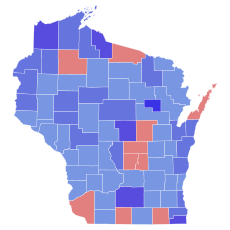 County results Nelson: 50–60% 60–70% 70–80% 80–90% Leonard: 50-60% | |||||||||||||||||
| |||||||||||||||||
Incumbent Democrat Gaylord A. Nelson (U.S. senator since 1963) defeated Republican State Senator Jerris Leonard.
| Party | Candidate | Votes | % | |
|---|---|---|---|---|
| Democratic | Gaylord Nelson (Incumbent) | 1,020,931 | 61.69 | |
| Republican | Jerris Leonard | 633,910 | 38.31 | |
| None | Write-ins | 20 | 0.00 | |
| Majority | 387,021 | 23.38 | ||
| Turnout | 1,654,861 | |||
| Democratic hold | ||||
Notes
- ^ a b c Reflecting the result of the November 1968 elections, only. Following those elections, upon the death of Alaska Democratic Senator Bob Bartlett and subsequent appointment of Republican Ted Stevens, the partisan balance at the beginning of the 91st United States Congress stood at 57–43 in favor of the Democrats.
- ^ a b The Liberal Party in New York nominated Jacob Javits, a Republican, but the Clerk of the U.S. House of Representatives did not tabulate their votes, totaling 458,936, into the national Republican total.[1]
- ^ a b c d e f g h i j k l m n o p q r s t u v w x y z aa Clerk of the U.S. House of Representatives (July 1, 1969). "Statistics of the Presidential and Congressional Election of November 5, 1968" (PDF). U.S. Government Printing Office. p. 54.
- ^ "Milton Weilenmann - Obituary". www.legacy.com. Retrieved September 10, 2020.
- ^ "Our Campaigns - AK US Senate Race - Nov 05, 1968". www.ourcampaigns.com. Retrieved September 9, 2020.
- ^ "AZ US Senate - D Primary Race - Sep 10, 1968". Our Campaigns. Retrieved December 19, 2017.
- ^ "AZ US Senate Race - Nov 05, 1968". Our Campaigns. Retrieved December 19, 2017.
- ^ "1968 Senatorial General Election Results - Illinois".
- ^ https://www.ourcampaigns.com/RaceDetail.html?RaceID=7035
- ^ "NY US Senate - D Primary Race - Jun 18, 1968". Our Campaigns. Retrieved December 19, 2017.
- ^ "NY US Senate - L Primary Race - Jun 18, 1968". Our Campaigns. Retrieved December 19, 2017.
- ^ "NY US Senate Race - Nov 05, 1968". Our Campaigns. Retrieved December 19, 2017.
- ^ "NC US Senate - D Primary Race - May 04, 1968". Our Campaigns. Retrieved December 19, 2017.
- ^ "NC US Senate - R Runoff Race - Jun 01, 1968". Our Campaigns. Retrieved December 19, 2017.
- ^ Lashkowitz's storied tenure
- ^ "OK US Senate Race - Nov 05, 1968". Our Campaigns. Retrieved December 19, 2017.
- ^ a b "OR US Senate" – via OurCampaigns.com.
- ^ a b "OR US Senate - D Primary" – via OurCampaigns.com.
- ^ a b "Primary Election Results" (PDF). Office of the Vermont Secretary of State. Retrieved June 17, 2015.
- ^ "General Election Results - U.S. senator - 1914-2014" (PDF). Office of the Vermont Secretary of State. Retrieved June 17, 2015.
References
- "Supplemental Report of the Secretary of State to the General Assembly of South Carolina." Reports and Resolutions of South Carolina to the General Assembly of the State of South Carolina. Volume II. Columbia, SC: 1969, p. 19.
- Kalk, Bruce H. (2001). The Origins of the Southern Strategy: Two-Party Competition in South. Lexington Books. p. 86.


